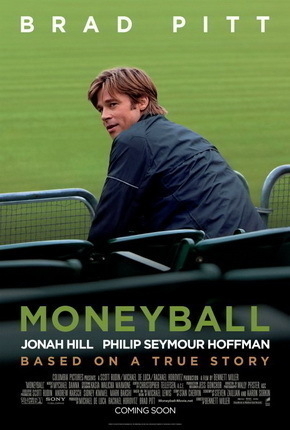Blog
MONEYBALL (2011): A Review
In case the fact that I run a nerd blog isn’t proof positive enough, I don’t really get sports. Â Sure, I get sucked into hockey and MMA (and in recent years find myself keeping an eye on the Ravens), but I’m not a sports guy really.
However, I am a sucker for a good sports movie. Any Given Sunday. Friday Night Lights. Hell, even the Major League movies.  Sports provide the last true black and white conflict in this world, one with pure winners, pure losers and the truest in the moment drama.  And I’m pleased to say, that while being as far removed from a traditional sports film as possible, Moneyball will go down not only as another sports film I loved, but perhaps one of my favorite films this year.
Based on a true story (later turned into a novel, which was then adapted for the screen by Aaron Sorkin and Steven Zaillian), Moneyball is the tale of Oakland A’s general manager Billy Beane (played here by Brad Pitt), a former ballplayer turned management.  After the 2001 season left his team gutted, not just by a divisional loss, but also by the growing cost of playing the game (his A’s, with a salary of $40 mil, lost to the Yankees, running off of a $120 mil budget).  At his wits end after being disappointed by the game of baseball for over half of his life, Beane meets a rather unique individual over at the Cleveland Indians - Peter Brand (played by Jonah Hill).  Brand is an economics major from Yale who sees baseball in a way that not many others have before - it’s not about putting out big money for big stars, it’s about putting out strategic money to get the players who can best deliver as a group, and helping that team win.
Of course, this unique way of managing a baseball team is the source of the drama in this film, and it is met with skepticism at all levels. The fans don’t like it (the movie smartly intercuts sports radio talk into the mix, as effective as it was in Friday Night Lights and Big Fan), the old-timer scouts hate it, the players don’t get it, and right at the top, A’s Manager Art Howe (a surly and stoic Phillip Seymour Hoffman) just won’t…play ball, to go for the weak pun.
The movie is an interesting thing to watch in motion - similar to Sorkin’s Oscar winning script for The Social Network, the movie strives to take something that is uninteresting (statistics and economics) and make it interesting. Â Luckily, in the capable hands of director Bennett Miller (Capote), the film doesn’t just strive, it thrives. Â What could be a rather dry concept is made real with strong characters up and down the cast, met equally by an adept team of actors who hit every beat of the very strong script. Â Jonah Hill and Brad Pitt aren’t a pairing that I’d expect to enjoy together, but their awkward chemistry is an absolute joy here. Â Pitt is in great form, proving once again how adept he is adding a silent rage to Beane, and as always, chewing scenery just at the right moments.
Special commendations must go to the cinematographer Wally Pfister (Inception, The Dark Knight).  Normally Christopher Nolan’s right hand man, he makes baseball truly look like the game of legends here, emphasizing the human drama with beautifully framed scenes that left me in awe.  After years of being bored by tired sports coverage on local television, Pfister’s work really blew me away.
If you’re so inclined, you can read up on the real story of the Oakland A’s and how they ended up doing during their 2002 season, but ultimately, it’s irrelevant.  This isn’t a movie about where the story ends, it’s about how the story gets there.  Just as The Social Network wasn’t truly a film about Facebook, this isn’t a film about baseball or stats - it’s about people looking to carve out something different and defining their moment in time.
Moneyball may get lost in this fall’s grouping of Oscar candidates, but as far as I’m concerned, it has a place in my best of 2011 list. Give it a chance, you may just fall in love with it.
Thursday September 8, 2011
